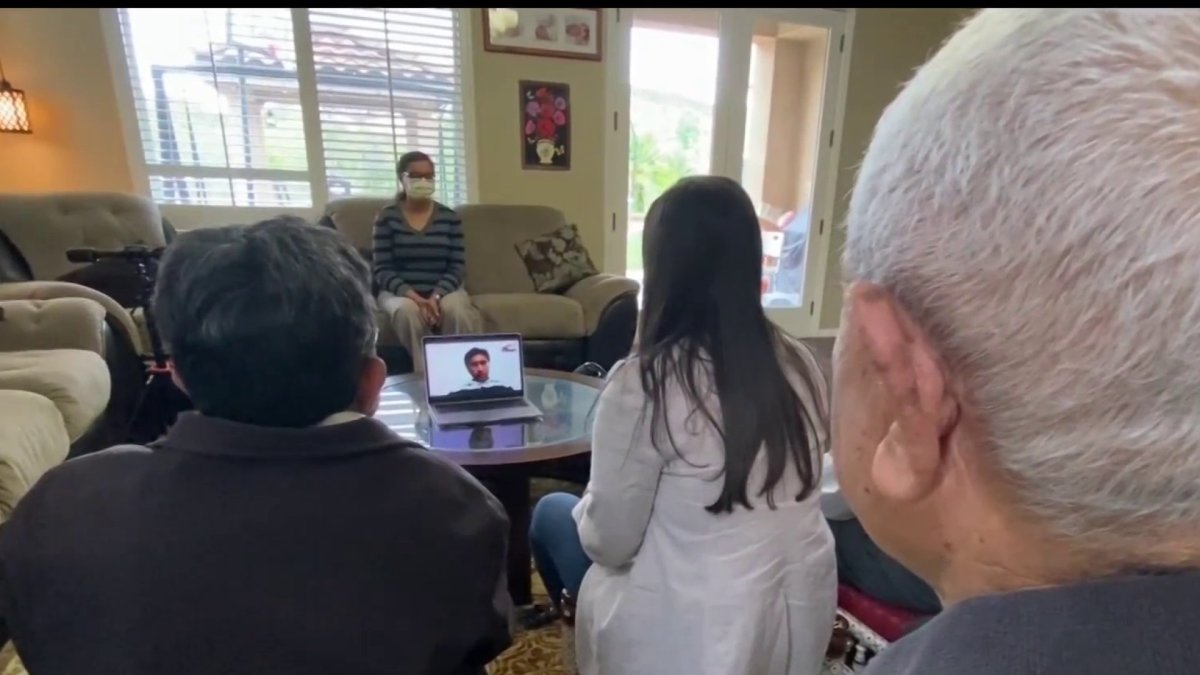
An Indian community n Scripps Ranch is sending some help to India as they struggle with high COVID-19 rates. NBC 7’s Allie Raffa reports.
While loved ones overseas fight for vaccine access, San Diego County resident Raj Zalavadiya said he has roughly 600 extra doses in his pharmacy's refrigerator because some are "still hesitant to get the vaccine."
As San Diego and the U.S. push past the coronavirus pandemic, COVID-19 continues to spread through India, where the government is warning that a third wave is inevitable as planeloads of emergency medical supplies begin to arrive from countries around the world.
Over the last week, the country of over 1 billion people is reporting close to 400,000 new COVID-19 cases and roughly 3,800 deaths each day.
The images coming out of the country are horrifying and for many in the Indian community, very personal.
Get San Diego local news, weather forecasts, sports and lifestyle stories to your inbox. Sign up for NBC San Diego newsletters.
Zaladaviya, the owner of Leo’s Lakeside Pharmacy, lives in Scripps Ranch, one of a few areas in San Diego with a sizable Indian community desperate to help loved ones overseas.
“Whatever I’m feeling…I’m 100% sure every Indian in America is feeling,” he said. “It doesn’t matter whether they’re from South India, North India or any part of India.”
Local
Many in the community are joining national organizations sending relief from all over the country after feeling helpless for weeks, watching the crisis spiral out of control and push the country’s health care system to collapse from thousands of miles away.
“We feel helpless because…we see the health care system here is very good and very organized and over there right now, it’s totally upside down,” Zalavadiya said. “A week ago, I was thinking, 'how am I going to help?' We are sending help -- all Indians…There is not one organization, but many smaller organizations. They’re doing their best.”
Zalavadiya told NBC 7 he and other members of the Indian community have donated to groups sending Remdesivir injections, PPE, vaccine doses, and perhaps most importantly, oxygen tanks and concentrators, which have been in critically short supply for weeks.
He said he’s even heard of Indian doctors in the U.S. providing friends and family overseas with medical advice over phone and video calls because they’re unable to access a hospital or afford private care.
“Whoever I talk to is finding a way to send help to India,” said Zalavadiya, who went to pharmacy school in India before emigrating to the U.S. in 2003. “Everyone in the Indian community is doing their part.”
He told NBC 7 he posted photos on Facebook Saturday of a vaccine drive he organized at Akshar Cash 'N' Carry, a local Indian grocery store -- the reaction from friends and family in India was almost immediate.
“They were like, ‘Oh can you send us some? Can you send us some?,’” he said, adding that he has roughly 600 vaccine doses stored in the refrigerator of his pharmacy because there hasn’t been enough demand to use them.
“People here are still hesitant to get the vaccine,” he said, adding that he feels powerless and almost guilty he has the lifesaving drugs at his disposal while so many in India desperately want the vaccine but don’t have access to it.
Nathan Fletcher, Chair of the San Diego County Board of Supervisors, acknowledged last Thursday at a weekly coronavirus briefing that despite more than 3 million vaccine doses being administered so far, the county will need to adjust its tactics to fully vaccinate the rest of the region.
“We have more doses than we have demand for appointments,” he said.
India is one of the world's biggest vaccine producers, but the country doesn’t have enough product for itself. Less than 5% of the country’s 1.4 billion population have been fully vaccinated, and its manufacturers now face a critical shortage of the raw materials needed to produce doses.
One of those waiting to be vaccinated in India is Zalavadiya’s cousin, Vishal, who has lost several family members to the second wave of the pandemic.
He told NBC 7 that because he lives in Surat, a large city of over 6 million people, it’s been difficult to coordinate getting a vaccine.
“Everyone except for me in my family has been vaccinated…the Indian population is too many so vaccinations will take some time,” he said. “Our government is doing good, but we still need help from everywhere. Help will be appreciated."
Emergency medical supplies from countries all over the world began arriving in India last week, but as cases continue to surge, concerns are growing about delays in getting aid to those most in need, especially in the country's rural areas where the health care infrastructure is much weaker.
NBC 7 spoke with Dr. Haresh Thumar, a transplant surgeon in charge of a COVID-19 ward at Bhailal Amin General Hospital in Vadodara, India, where more than 200 virus patients are being treated.
Dr. Thumar said he’s worried even more dangerous variants will form and spread if the crisis can’t be controlled soon, potentially cutting the already-dwindling number of caregivers across the country.
“Really as a health care worker or as a doctor, we feel helpless…What I fear and what many of my doctor colleagues fear is that if this goes on like this, the next thing to happen is a scarcity of manpower like nursing staff and doctors -- if they are affected that’ll be a scary situation,” he said. “Even if you have oxygen, beds, ventilators, medicines, ICUs, if you don’t have nursing staff or doctors, it’s going to be the worst-case scenario. That should not happen at any cost.”
Dr. Thumar told NBC 7 the most critically needed supplies in India right now are oxygen cylinders, concentrators and respirators.